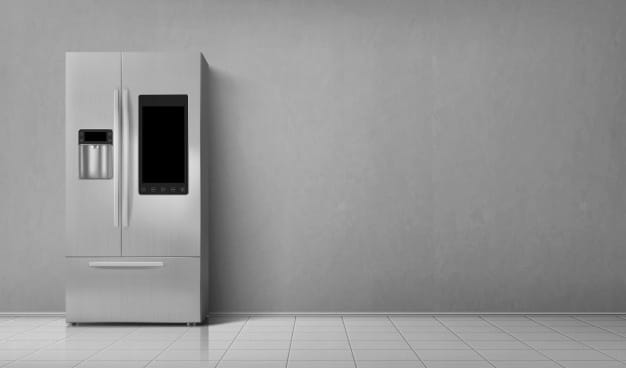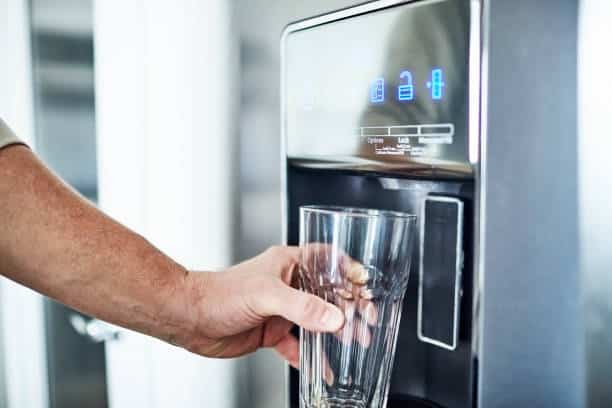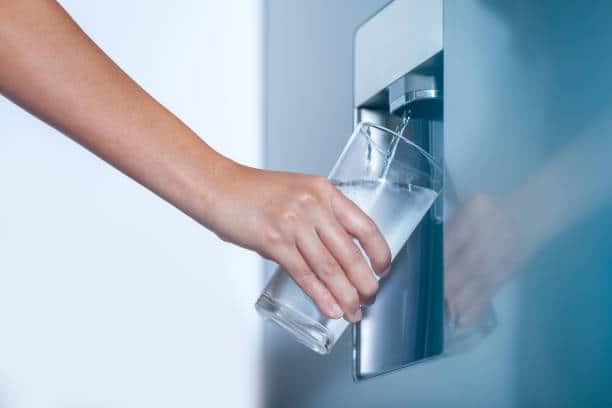Not having a supply of clean drinking water is no anymore an option today. But unfortunately, due to the alarming pollution that has contaminated our planet’s natural resources, nothing that comes straight from the source is reliable.
Table Of Contents
−- Refrigerator Water Filters in a nutshell
- Top 5 Refrigerator Water Filters
- A Buyer’s Guide to Choosing the Right Refrigerator Water Filter
- Benefits of Clean Drinking Water
- Advantages of having a Refrigerator Water Filter
- Downsides of owning a Refrigerator Water Filter
- How it Works
- Why do you need to replace the filter?
- Refrigerator Filter Installation Guide
- Frequently Asked Questions (FAQs)
- Conclusion
One good example of that is water.

It is common knowledge that water contains a lot of unknown contaminants, and we cannot risk having any foreign substances inside our bodies. Therefore, having water filters in our homes is almost becoming a necessity rather than just a luxury.
Fortunately, there are already a wide variety of water filters available in the market today, and you can select from an array of choices that fit your needs and your financial capacity. One example of those water filters is a refrigerator water filter.
Bottled waters are costly and not to mention, extremely damaging to the environment. Refrigerator filters make use of readily available water directly from your supply.
This sounds like fairly new technology, and there are still a lot of things you have to know about the device so you can properly weigh your options and pick the right model that works for you.
This post will show you some of the best models of refrigerator filters out there, along with other essential information.
Refrigerator Water Filters in a nutshell
Modern refrigerators today have a built-in dispenser for ice and water. From the device’s name, these little filters clean the water from your fridge even further to provide you with guaranteed safe drinking water.
These usually employ the activated carbon mechanism of water filtration that is effective in removing chlorine, heavy metals, and other unwanted chemicals.
Top 5 Refrigerator Water Filters
1. EveryDrop by Whirlpool Refrigerator Water Filter
Whirlpool is a well-known appliance brand with a lot of great consumer feedback. It does not disappoint when it comes to refrigerator water filters as well. This filter model is also compatible with brands like Amana, Maytag, JennAir, and KitchenAid.
Your water undergoes three stages of filtration with this model – particle filtration, microfiltration, and adsorption filtration – ensuring up to 99% of total lead removal and elimination of other contaminants, including but not limited to pesticides, parasites, and other forms of disinfectants or organic substances.
The lifespan of EveryDrop Filters can reach up to 6 months and has an estimated capacity of filling up around 1,500 water bottles in that period which is a comfort to your pockets.
- Make sure this fits by entering your refrigerator model number.
- Everydrop Filter 5 is the only filter approved by: Whirlpool, Maytag, Amana, KitchenAid, and JennAir brands.
Pros
- 6 months before replacement is needed
- Works well with a lot of other brands
- Eliminates contaminants and chemicals from water
- 3 filtration stages
Cons
- No product warranty
2. GE RPWFE2PK RPWFE 2 Pack Refrigerator Water Filter
On a budget but still want top-notch performance? The GE RPWFE2PK RPWFE 2 Pack Refrigerator Water Filter is your best bet regarding budget-friendly efficiency. Your drinking water will be free from contaminants, and your wallet won’t have to suffer for it.
This filter eliminates lead, mercury, cysts, asbestos, pesticides, and other chemicals from your water supply. This also means that it won’t have any unpleasant taste or odor.
One feature that makes this model stand out is its RFID (radio frequency identification) chip that indicates when the filter needs to be replaced. Like the model above, the filter lasts around 6 months as well, with a capacity of 300 gallons throughout its lifespan.
- It is compatible with any refrigerator that uses GE RPWF or RPWFE filters. It is used in selected GE french-door refrigerators. Compatible with select GE french-door refrigerators.
- GE’s most advanced filtration: Tested and verified to filter five trace pharmaceuticals. Operation Water Pressure (psi): 25 min. – 120 max.
Pros
- 300 gallons capacity for its entire lifespan
- With a warranty for all defective parts
- Smart indicator for filter replacement
- Thoroughly cleanses your water
Cons
- Slight hassle when connecting the RFID
3. Culligan IC 1 EZ-Change Refrigerator Filtration System
This is perfect for households with a chlorinated water supply because this model specializes in treating your water mainly from chlorine content and its effects on the water’s taste and smell.
Culligan IC 1 EZ-Change Refrigerator Filtration System has a unique inline filtration system that purifies your water supply before entering your refrigerator. This can also help extend your refrigerator’s lifespan and protect it from potential damages that contaminated water can inflict on it.
What makes this worth the purchase are its 1-year lifespan and 3000 gallons capacity. The manufacturer also includes a warranty of 2 years for this model.
- Provides your family with visibly clean, great-tasting water for drinking, cooking, and more
- FEATURES: Reduces bad taste and odor, chlorine taste and odor, and particulate class III; EZ change replacement filter cartridge; Quick connect fittings; Twist-on/twist-off; Double water shutoff; Includes filter head with mounting hardware
Pros
- 12 months lifespan + 3000 gallons capacity
- 2 years warranty
- Complete installation kit with guide
- Inline-style filtration that filters the water before reaching your refrigerator
Cons
- Slightly difficult installation process
4. Samsung Da29-00020b-1P Refrigerator Water Filter
Let’s start with the drawbacks of this model first. It’s hard to find filters that go with many refrigerator models today, just like the first one on the list. Some brands make filters that only work with their refrigerators.
This water filter by Samsung is proof of that. It does not work with any other refrigerator except Samsung. You’re lucky if you already own a Samsung fridge, but if you don’t and want this filter, sadly, it won’t work for you.
Nonetheless, the power of this filter to remove up to 90% of chlorine content, lead content, microbes, and other foreign contaminants remains efficient. As a result, you can expect maximum purity and clarity in your drinking water.
It has the same 6 months lifespan as the average and can filter up to 300 gallons of water. It also has a built-in indicator panel that monitors how much water has been filtered, so you’ll know when it’s time to change the filter.
- Samsung DA29-00020B refrigerator water filter replacement is undoubtedly worth every penny for its efficiency and reliability. You can also be assured that authorities test this since it has certifications issued by the NSF. Furthermore, the carbon block replacement made of coconut shells from Sri Lanka works very well.
- Advance Filtration Process. This DA29-00020B water filter replacement by Waterdrop has the power to remove the majority of chlorine content in your water, taking away the taste and odor along with other foreign substances. Not only that, but it also retains the essential minerals and electrolytes the body needs from water.
Pros
- 6 months lifespan and 300 gallons capacity
- Maximum elimination of contaminants
- Digital indicator panel
- Increases refrigerator lifespan
Cons
- Exclusive only to Samsung brands and selected models
5. Waterdrop NSF 53&42 Certified DA29-00020B Refrigerator Water Filter
If you have problems with heavy lead and microbial cysts in your water supply, this is the right one for you. With 53 & 42 NSF certification, Waterdrop guarantees almost 100% total removal of those mentioned contaminants to provide you with clean water while also increasing your refrigerator’s lifespan.
This filter works with selected Samsung and Kenmore refrigerator models and uses a coconut carbon filter block for its filtration process.
Like most filters, it also has a 6-month lifespan and 300-gallon capacity, but it has no indicator to tell you about the status of the filter, so you need to take note of the expiration date.
- This Waterdrop DA29-00020B refrigerator water filter replacement is undoubtedly worth every penny for its efficiency and reliability. You can also be assured that authorities test this since it has certifications issued by the NSF. Furthermore, the carbon block replacement made of coconut shells from Sri Lanka works very well.
- Advance Filtration Process. This DA29-00020B water filter replacement by Waterdrop has the power to remove the majority of chlorine content in your water, taking away the taste and odor along with other foreign substances. Not only that, but it also retains the essential minerals and electrolytes the body needs from water.
Pros
- More than 99% elimination of lead and microbial cysts
- 6 months lifespan and 300 gallons capacity
- Topnotch performance, giving you safe and clean drinking water
Cons
- Only works with selected models; not compatible with all refrigerator models
A Buyer’s Guide to Choosing the Right Refrigerator Water Filter
Navigating the market for a refrigerator water filter requires a basic understanding of some technical concepts to determine what will work best for your situation. No one size fits all when it comes to these filters as each model is designed differently. Here, we’ll share some tips on how to select a refrigerator water filter wisely to get the most value out of your purchase.
Compatibility
Before anything else, ensure your filter is compatible with your fridge. Check your user manual for this information. If it’s unavailable, the model number on the fridge can help you find compatible filters. Some older refrigerator models lack a cartridge for water filters, necessitating an inline water filter instead.
Level of Filtration Required
Water quality varies across regions, leading to different contaminants. A refrigerator water filter may not eliminate all types of contaminants, so choose a model that targets the impurities you want to remove. For instance, a chlorine-removing filter may suffice for improving taste and odor if your water is relatively clean, but heavily contaminated supplies might require a heavy-duty filter for substances like heavy metals and organic disinfectants.
Price
Financial capacities differ, so set a budget to narrow down models within your price range. Consider the filter’s lifespan too; most last up to 6 months, but some endure a year. Assess whether you can accommodate the filter replacement cost in your budget.
Installation and Maintenance
Ease of installation and maintenance varies among filters, often depending on the complexity of the filter design. Filters occupy different spots in different refrigerator models, with some being more accessible than others.
Removal of Contaminants
Most refrigerator filters target chlorine, but others can handle lead and other chemical disinfectants. Depending on the contaminants in your water, you may need a larger, heavy-duty filter like those employing reverse osmosis or functioning as a whole house filter.
Original Equipment Manufacturer or Generic Brand
Some filters compatible with multiple refrigerator brands aren’t manufacturer-made. Though generic brand filters compatible with various fridge models are often economical, thorough research is necessary. Gather customer feedback and look for certifications to ensure quality isn’t compromised.
Certifications and Trusted Quality
A 42 NSF Certification is a reliable indicator of quality for refrigerator water filters, signifying the product has passed rigorous quality testing. Look for this certification when choosing a model.
Warranty
Typical manufacturer warranties for refrigerator filters span 30 days, covering defects encountered during this period under specific terms and conditions. Depending on your trust in the manufacturer, decide whether a warranty is a deal-breaker for you.

Benefits of Clean Drinking Water
Water is essential for survival and daily bodily functions. Ensuring your water is clean safeguards you against waterborne diseases and other health issues. Clean water detoxifies our bodies, enhances blood circulation, aids digestion, and may even reduce the risk of certain cancers.
Advantages of having a Refrigerator Water Filter
Modern refrigerators often come with built-in inline water filters, providing a host of benefits like instant access to cold, filtered water, prevention of water-acquired diseases, efficient filtration with a lifespan of 6 months to a year, and improved taste by removing chlorine.
Downsides of owning a Refrigerator Water Filter
Despite the benefits, there are downsides like recurring costs for filter replacements, incompatibility with your faucet, and potential reduction in water pressure, especially as the filter nears the end of its lifespan.
How it Works
Understanding the filtration process involves recognizing three main stages: Large Mechanical Filter for larger solids, Fine Mechanical Filter for finer particles, and Activated Carbon Filter for adsorbing remaining impurities.
Why do you need to replace the filter?
Over time, the filter becomes less efficient, necessitating replacement to maintain water quality. Understanding the lifespan of Mechanical Filters and Activated Carbon Filters helps in gauging when a replacement is due.

Refrigerator Filter Installation Guide
Installing a refrigerator filter doesn’t have to be a daunting task. With a little guidance, you can get it done effortlessly. Most units come with a detailed installation kit and guide, making the process even more straightforward. The placement of the filters can vary, but common spots include in-grille, canister, drop-down, or slide-out filters. Here’s a closer look at these and the general steps for installation:
- Spotting the Filter Location:
- In-grille Filters: Typically located at the bottom front of your fridge, they might be concealed within the grille and can be ejected by either twisting or pushing.
- Canister Filters: Found inside the refrigerator, right above the food compartment, these are shorter but wider and can be removed with a simple turn.
- Drop-down Filters: These have a dedicated container usually located at the top, housing the filter inside.
- Slide-out Filters: Also located inside the refrigerator, they can be ejected with a 45-degree turn or a press of a button.
- Preparation:
- Begin by thoroughly reading the installation guide or instruction manual that comes with your unit.
- Ensure the water supply to your fridge is turned off to prevent any water mishaps.
- Detaching and Attaching:
- Detach the water line from your appliance and attach it to the filter ensuring all connections are secure.
- Priming the Filter:
- Run water through the filter for about 10 minutes to prime it. Use a bucket to collect the water and check for any leaks.
- Reattachment:
- Once primed, reattach the water line to your fridge.
- Enjoy Your Filtered Water:
- Now, you’re all set to enjoy clean, filtered water from your refrigerator.
This simplified guide aims to provide a hassle-free installation experience. However, always refer to the specific instruction manual of your model for a more accurate installation process as designs may vary across different refrigerator models.
Frequently Asked Questions (FAQs)
- Is it easy to replace a refrigerator water cartridge?
- Absolutely. The replacement procedure is often outlined in the instruction manual, making it a straightforward task for most individuals.
- Is it mandatory to replace the filter every six months?
- While 6 months is a general guideline, the actual lifespan of a filter can vary based on factors like water quality and usage frequency. It’s crucial to replace the filter when necessary to ensure optimal water quality.
- How can I ascertain if my fridge already has a built-in water filter?
- Usually, the ice dispenser and water filter are situated together, making it easier to locate the filter. Additionally, the refrigerator’s specifications often indicate the presence of a built-in filter.
- How can I reset the filter change indicator light?
- If your refrigerator is equipped with a filter change indicator light, it’s important to reset it with every filter replacement. The reset procedure is typically detailed in the instruction manual specific to your model.
- What contaminants can refrigerator water filters remove?
- Refrigerator water filters are effective in removing a variety of contaminants including chlorine, dissolved solids, mineral deposits, heavy metals, and some microbes, enhancing the safety and taste of your water.
- Is there a separate filter for both the icemaker and water dispenser?
- Generally, a single filter serves both the icemaker and water dispenser as it’s placed in the water line before entering the appliance. However, the design may vary with different refrigerator models.
- Are refrigerator filters recyclable?
- As of now, there isn’t sufficient information regarding the recyclability of refrigerator filters. It’s advisable to follow the disposal instructions provided by the manufacturer or local recycling guidelines.
Conclusion
Planning to purchase a refrigerator water filter takes a lot of careful thinking and wise considerations.
However, we hope that this guide somehow gave you relevant information and helped push you in the right direction as you weigh your options on what to purchase. As a parting word, we will share with you our top recommendation:
In terms of lifespan and reliable quality, this is our best bet. With a lifespan of 1 year and a 2-year warranty, you are sure to get the most out of your money.

Jay
Jay is a health and wellness enthusiast with expertise in water quality and nutrition. As a knowledgeable advocate for holistic well-being, Jay successfully manages Type 2 Diabetes through informed lifestyle choices. Committed to sharing reliable and authoritative insights, Jay combines firsthand experience with a passion for enhancing health."






